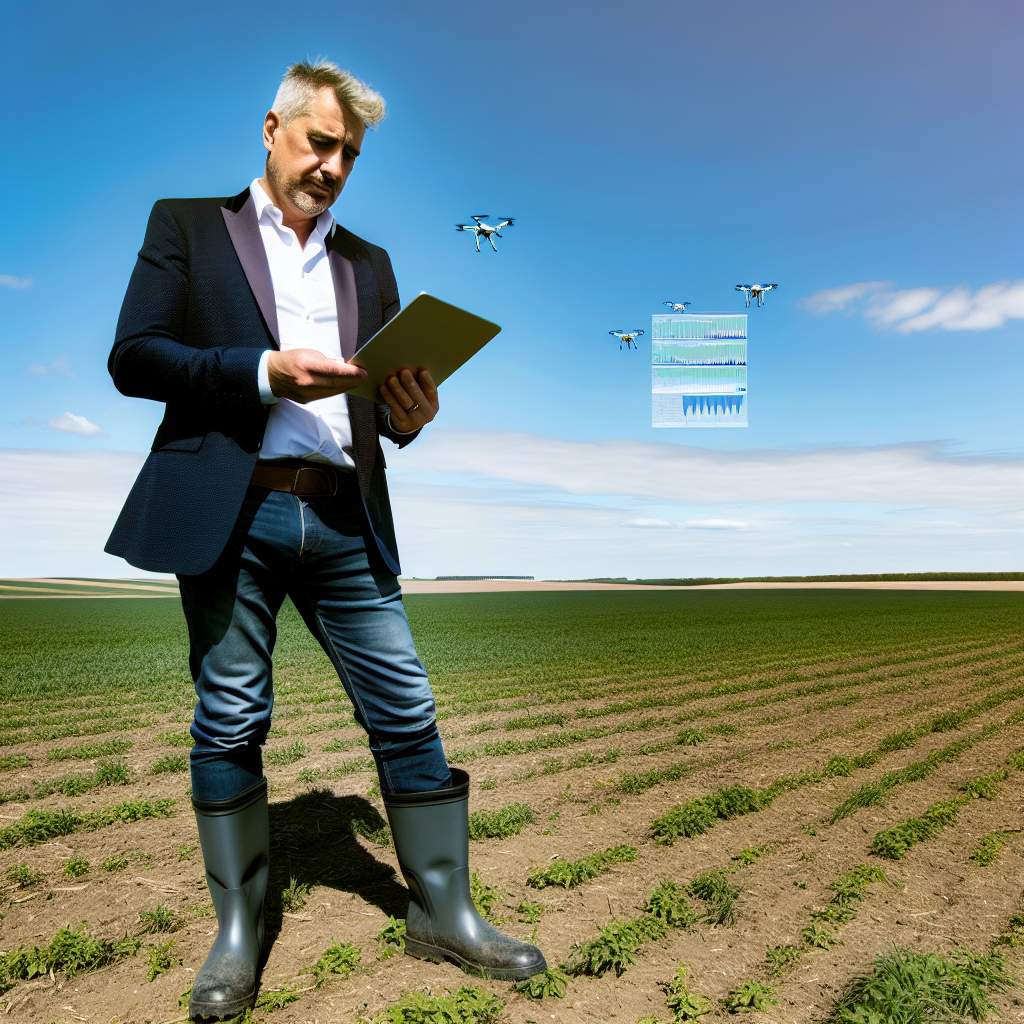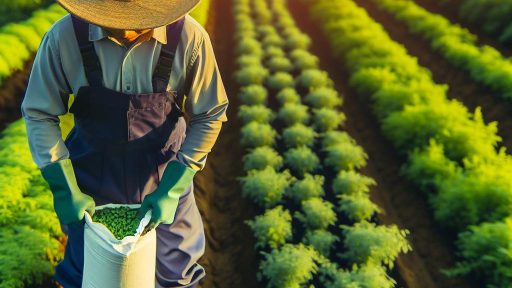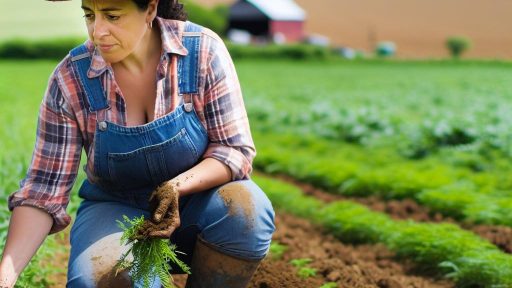Introduction to Farmland Sustainability and Real Estate Investment
Farmland sustainability plays a crucial role in today’s real estate market.
This concept intertwines agricultural practices with environmental stewardship.
Investors increasingly recognize its impact on property value.
Understanding this relationship can amplify investment returns.
The Importance of Sustainable Practices
Sustainable farming enhances soil fertility and crop yield.
It mitigates environmental hazards such as soil erosion and water depletion.
Moreover, it promotes biodiversity, critical for healthy ecosystems.
Investors find value in properties practicing these sustainable techniques.
Economic Benefits of Sustainable Farmland
Sustainable farmland often yields higher financial returns over time.
Land with sustainable practices typically attracts premium prices.
It can also reduce costs associated with land degradation and restoration.
Investors appreciate the long-term economic benefits of sustainability.
Market Trends in Real Estate Investment
The real estate market increasingly values sustainability in farmland.
More buyers are seeking properties that prioritize eco-friendly practices.
This trend leads to rising demand for sustainably managed farms.
Transform Your Agribusiness
Unlock your farm's potential with expert advice tailored to your needs. Get actionable steps that drive real results.
Get StartedInvestors need to align their portfolios with these market dynamics.
The Role of Technology in Sustainability
Technology enhances sustainable farming methods significantly.
Precision agriculture optimizes resource use and minimizes impact.
Innovations improve crop management and field monitoring practices.
As a result, tech-savvy investors see substantial growth opportunities.
Impacts on Investment Returns
Integrating farmland sustainability into investment strategies is vital.
It influences market demand and enhances property values.
As sustainability practices evolve, so will investment potential.
Investing in sustainable farmland can yield significant returns.
The Economic Benefits of Sustainable Farming Practices
Enhancement of Land Value
Sustainable farming practices significantly enhance land value over time.
Investors notice that well-managed land retains its productivity and quality.
As a result, this attracts higher prices in real estate transactions.
Reduction of Operational Costs
Sustainable practices often lead to reduced operational costs for farmers.
Efficient resource management minimizes waste and lowers input costs.
Consequently, farmers can allocate resources more effectively, improving profits.
Attraction of Premium Markets
Consumers increasingly prefer sustainably grown products.
As such, farmers can tap into premium markets and higher price points.
This shift enhances profit margins and boosts overall financial returns.
Long-Term Soil Health
Healthy soil is fundamental for future agricultural productivity.
Sustainable practices, such as crop rotation and organic fertilization, build soil health.
Additionally, this reduces the need for chemical inputs over time.
Creation of Ecosystem Services
Farmers managing land sustainably contribute positively to ecosystem services.
Benefits include improved water quality, carbon sequestration, and biodiversity enhancement.
These services are increasingly recognized and valued in real estate assessments.
Showcase Your Farming Business
Publish your professional farming services profile on our blog for a one-time fee of $200 and reach a dedicated audience of farmers and agribusiness owners.
Publish Your ProfileAccess to Funding and Incentives
Many governments offer grants and incentives for sustainable practices.
Farmers can leverage these financial opportunities to offset initial investments.
Additionally, financial institutions favor lending to environmentally responsible projects.
Community and Economic Resilience
Sustainable farming fosters community well-being and local economies.
Strong local food systems enhance resilience against economic fluctuations.
This resilience improves market stability, positively impacting real estate values.
Analyzing the Impact of Farmland Sustainability on Property Value
Understanding Farmland Sustainability
Farmland sustainability ensures ecological health and productivity.
This method uses resources efficiently while preserving the environment.
Moreover, it encourages practices that lead to long-term agricultural viability.
Effects on Property Value
Sustainable farming practices can significantly enhance property values.
This increase occurs due to growing consumer interest in environmentally-friendly products.
Higher property values reflect reduced risks and improved profitability for investors.
Market Trends and Investment Returns
The demand for sustainably farmed land continues to rise.
Investors are increasingly considering sustainability in their property decisions.
This trend indicates a shift toward valuing eco-friendly practices in agriculture.
Long-Term Investment Benefits
Investing in sustainable farmland offers multiple long-term advantages.
For instance, it attracts more buyers looking for eco-conscious options.
Moreover, sustainable practices often lead to lower operational costs.
Challenges and Considerations
Despite the benefits, challenges remain in adopting sustainable methods.
Initial investment costs can deter some property buyers and investors.
Additionally, regulatory changes may impact farming practices and investment decisions.
Investment Viability of Sustainable Farmland
The potential for increased returns makes sustainable farmland an attractive investment.
Understanding this impact can help investors make informed decisions.
Uncover the Details: How to Balance Soil pH for Effective Fertilizer Absorption
Market Trends: How Sustainability Attracts Modern Investors
The Shift Towards Sustainable Investments
Investors are increasingly prioritizing sustainability in their portfolios.
This trend reflects a growing awareness of environmental issues.
Furthermore, sustainable investments tend to offer attractive returns.
Green farmland, in particular, has captured the interest of many investors.
Benefits of Investing in Sustainable Farmland
Sustainable farmland contributes to ecological health and productivity.
This type of investment often aligns with long-term profitability.
Moreover, it appeals to socially-conscious investors.
Investors recognize the value of ethical farming practices.
- It promotes preservation of natural resources.
- It reduces dependence on harmful chemicals.
- It enhances community relations through local sourcing.
Consumer Preferences Shaping the Market
Consumer preferences are evolving towards sustainable products.
People increasingly seek out organic and ethically sourced food.
This demand influences investors to consider sustainable farmland.
As a result, farmland sustainability plays a crucial role in real estate strategy.
Impact of Regulations and Incentives
Government regulations are increasingly favoring sustainable practices.
Subsidies and incentives support eco-friendly farming initiatives.
This creates a favorable environment for sustainable farmland investments.
Consequently, investors can expect better long-term stability.
Showcase Your Farming Business
Publish your professional farming services profile on our blog for a one-time fee of $200 and reach a dedicated audience of farmers and agribusiness owners.
Publish Your ProfileFuture Trends in Sustainable Real Estate Investment
Looking forward, sustainability will become pivotal in investment strategies.
Emerging technologies will enhance sustainable farming practices.
Investors will likely prioritize properties with sustainability certifications.
Such properties are expected to provide higher returns over time.
Ultimately, the future of real estate investment is undeniably green.
Find Out More: Common Weed Types That Impact Agricultural Land Value
Case Studies: Successful Sustainable Farms and Their ROI
The Green Fields Initiative
The Green Fields Initiative transformed traditional farming into sustainable practices.
This Vermont-based farm implemented crop rotation and organic fertilization.
As a result, they reported a 30% increase in yields.
Investors noted improved soil health and a reduction in pesticides.
Consequently, the farm’s popularity surged, boosting direct sales to consumers.
Sunny Haven Organic Farm focuses on community-supported agriculture.
They emphasize local produce and sustainable methods.
This approach has led to a loyal customer base.
They achieved a remarkable return on investment, exceeding industry averages.
Moreover, they educated consumers about the benefits of organic farming.
Green Acres Agroforestry
Green Acres Agroforestry combines traditional crops with trees.
This innovative strategy enhances biodiversity and reduces erosion.
They enjoy lower input costs due to natural pest control.
Their ROI jumped significantly compared to conventional farms.
This success resulted in broader recognition within the agricultural community.
Farmers’ Co-op of Sustainable Agriculture
This cooperative supports multiple environmentally friendly farms.
Collective marketing strategies have maximized profits for all members.
Members reported higher returns through shared resources and knowledge.
They enhance technological advancements by pooling investments.
As a result, they set a benchmark for sustainable farming practices.
Meadow Ridge Biodynamic Farm
Meadow Ridge utilizes biodynamic farming practices that restore soil fertility.
This approach fosters ecological health as well as crop productivity.
They achieved impressive financial returns despite initial setup costs.
Their positive impact on the environment resonates with eco-conscious investors.
This farm highlights the financial viability of sustainable practices in agriculture.
Discover More: Choosing the Right Irrigation System for Farming Landowners

Government Policies and Incentives for Sustainable Agricultural Practices
Overview of Government Initiatives
Governments worldwide implement policies to encourage sustainable agriculture.
These initiatives aim to enhance food security and promote environmental health.
Incentives often include financial assistance and tax breaks for farmers.
Types of Policies Supporting Sustainability
Government policies range from direct subsidies to regulatory frameworks.
Subsidies reduce production costs for sustainable practices.
Regulatory frameworks enforce best practices in farming techniques.
Both approaches aim to shift farming towards more sustainable models.
Key Incentives for Farmers
Farmers can benefit from various incentives designed to support sustainable practices.
Showcase Your Farming Business
Publish your professional farming services profile on our blog for a one-time fee of $200 and reach a dedicated audience of farmers and agribusiness owners.
Publish Your Profile- Grants for implementing eco-friendly technologies
- Tax credits for conservation efforts
- Low-interest loans for purchasing sustainable equipment
These incentives alleviate the financial burden on farmers transitioning to sustainable methods.
Impact of Policies on Real Estate Values
Sustainable farming practices can increase farmland value over time.
Investors are increasingly attracted to properties with sustainable certifications.
Policies promoting these practices enhance the appeal of agricultural investments.
Challenges and Future Directions
While policies are beneficial, challenges remain in implementation.
Farmers may struggle with the costs of transitioning to sustainable methods.
Future improvements could focus on providing further financial support.
Continued government commitment is essential for advancing sustainable agriculture.
Find Out More: Improving Soil Fertility Through Proper Fertilizer Management
The Role of Technology in Enhancing Farmland Sustainability and Investment Returns
Improving Crop Yields with Precision Agriculture
Technology enhances crop yields through precision agriculture techniques.
Farmers use GPS and sensors to monitor soil health and moisture levels.
These tools provide data that helps optimize planting schedules and fertilizer use.
As a result, investors see increased productivity from sustainable practices.
Integrating Renewable Energy Solutions
Renewable energy technologies promote sustainability in farmland management.
Wind turbines and solar panels provide energy for farming operations.
These solutions reduce dependence on fossil fuels and lower operating costs.
Investors benefit from lower energy expenses and potential tax incentives.
Utilizing Drones for Efficient Monitoring
Drones allow for efficient monitoring of large agricultural areas.
They capture high-resolution images that reveal crop health issues.
This proactive approach enables timely interventions, enhancing yield quality.
Consequently, improved crop quality leads to better market prices and returns.
Implementing Smart Irrigation Systems
Smart irrigation systems utilize technology to manage water consumption.
Sensors assess soil moisture levels and weather conditions for optimal irrigation.
This efficiency conserves water resources and reduces operational costs.
Investors recognize savings in utility costs as a positive return on investment.
Leveraging Data Analytics for Decision Making
Data analytics transforms the way farmers approach crop management.
Farmers analyze historical data to predict crop performance and trends.
This informed decision-making enhances overall productivity and sustainability.
As a result, farmland sees increased economic value over time.
Strengthening Market Position through Sustainable Certification
Sustainable certification attracts environmentally conscious consumers.
Many brands and retailers seek products that have sustainable certification.
Investors can tap into premium pricing that comes from these certifications.
This enhances both marketability and financial returns for farmland investments.
Future Projections: The Long-Term Viability of Sustainable Farmland Investments
The Growing Demand for Sustainable Practices
The demand for sustainable farming practices continues to rise.
Investors recognize the significance of environmentally friendly agriculture.
Market trends show an increasing preference for sustainability.
Consequently, farmland sustainability could enhance property values.
Investment Risk Mitigation
Sustainable farmland investments often present lower risks.
Legal restrictions are increasingly favoring sustainable practices.
This trend reduces potential liabilities for investors.
Showcase Your Farming Business
Publish your professional farming services profile on our blog for a one-time fee of $200 and reach a dedicated audience of farmers and agribusiness owners.
Publish Your ProfileAdditionally, sustainable farms are more resilient to climate change.
Technological Advancements in Agriculture
Innovations in agricultural technology support sustainability.
These advancements can increase crop yields and decrease waste.
As a result, tech-driven sustainable practices attract investment.
Furthermore, automated systems enhance operational efficiency.
Consumer Trends Favoring Sustainability
Consumers are driving the demand for sustainably produced goods.
This shift results in higher profit margins for sustainable farms.
Investors benefit from these market dynamics, increasing returns.
Furthermore, brands that embrace sustainability often gain consumer loyalty.
Policy and Regulatory Support
Government policies increasingly favor sustainable agricultural practices.
This regulatory support can provide financial incentives for investors.
Grants and subsidies often target sustainable farming initiatives.
Such support enhances the attractiveness of these investments.
The Long-Term Viability of Sustainable Investments
The long-term outlook for sustainable farmland remains bright.
Investing in sustainable agriculture aligns with global sustainability goals.
Overall, these investments can deliver robust returns over time.
Investors can capitalize on the growing trend toward sustainability.
Additional Resources
Unlocking Profitable Farmland Investments: Strategic Asset …
Weather’s Impact on Investing in US Agriculture: Navigating the New …




